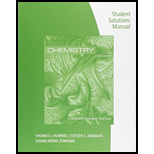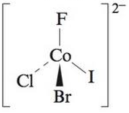
Student Solutions Manual for Zumdahl/Zumdahl/DeCoste?s Chemistry, 10th Edition
10th Edition
ISBN: 9781305957510
Author: ZUMDAHL, Steven S.; Zumdahl, Susan A.; DeCoste, Donald J.
Publisher: Cengage Learning
expand_more
expand_more
format_list_bulleted
Textbook Question
Chapter 21, Problem 90CWP
Which of the following molecules exhibit(s) optical isomerism?
a. cis-Pt(NH3)2Cl2
b. trans-Ni(en)2Br2 (en is ethylenediamine)
c. cis-Ni(en)2Br2 (en is ethylenediamine)
d. 
Expert Solution & Answer
Trending nowThis is a popular solution!

Students have asked these similar questions
Why doesn't this carry on to form a ring by deprotonating the alpha carbon and the negatively-charged carbon attacking the C=O?
6. A solution (0.0004 M) of Fe(S2CNEt2)3 (see the structural drawing below) in chloroform
has absorption bands at:
350 nm (absorbance A = 2.34);
514 nm(absorbance A = 0.0532);
Calculate the molar absorptivity values for these bands. Comment
on their possible nature (charge transfer transitions or d-d
S
N-
transitions?).
(4 points)
What is the mechanism for this?
Chapter 21 Solutions
Student Solutions Manual for Zumdahl/Zumdahl/DeCoste?s Chemistry, 10th Edition
Ch. 21 - What two first-row transition metals have...Ch. 21 - Prob. 2RQCh. 21 - Prob. 3RQCh. 21 - Prob. 4RQCh. 21 - Prob. 5RQCh. 21 - Prob. 6RQCh. 21 - Prob. 7RQCh. 21 - Prob. 8RQCh. 21 - Prob. 9RQCh. 21 - Prob. 10RQ
Ch. 21 - Prob. 1ALQCh. 21 - Prob. 2ALQCh. 21 - Prob. 3ALQCh. 21 - Prob. 4ALQCh. 21 - Prob. 5QCh. 21 - Four different octahedral chromium coordination...Ch. 21 - Prob. 7QCh. 21 - Prob. 8QCh. 21 - Prob. 9QCh. 21 - Prob. 10QCh. 21 - Prob. 11QCh. 21 - Prob. 13QCh. 21 - Prob. 14QCh. 21 - Which of the following ligands are capable of...Ch. 21 - Prob. 16QCh. 21 - Prob. 17QCh. 21 - What is the maximum number of unpaired d electrons...Ch. 21 - Prob. 19QCh. 21 - Prob. 20QCh. 21 - Prob. 21QCh. 21 - Prob. 22QCh. 21 - Prob. 23ECh. 21 - Prob. 24ECh. 21 - Prob. 25ECh. 21 - Prob. 26ECh. 21 - Prob. 27ECh. 21 - Prob. 28ECh. 21 - Prob. 29ECh. 21 - Prob. 30ECh. 21 - Prob. 31ECh. 21 - When an aqueous solution of KCN is added to a...Ch. 21 - Consider aqueous solutions of the following...Ch. 21 - A coordination compound of cobalt(III) contains...Ch. 21 - Prob. 35ECh. 21 - Prob. 36ECh. 21 - Prob. 37ECh. 21 - Prob. 38ECh. 21 - Prob. 39ECh. 21 - Give formulas for the following complex ions. a....Ch. 21 - Prob. 41ECh. 21 - Prob. 42ECh. 21 - Prob. 43ECh. 21 - Amino acids can act as ligands toward transition...Ch. 21 - Prob. 45ECh. 21 - Prob. 46ECh. 21 - Prob. 47ECh. 21 - Prob. 48ECh. 21 - Prob. 49ECh. 21 - Prob. 50ECh. 21 - Prob. 51ECh. 21 - Prob. 52ECh. 21 - Prob. 53ECh. 21 - Prob. 54ECh. 21 - The CrF64 ion is known to have four unpaired...Ch. 21 - Prob. 56ECh. 21 - Prob. 57ECh. 21 - The complex ion Fe(CN)63 is paramagnetic with one...Ch. 21 - Prob. 59ECh. 21 - Prob. 60ECh. 21 - Prob. 61ECh. 21 - Prob. 62ECh. 21 - The wavelength of absorbed electromagnetic...Ch. 21 - The complex ion NiCL42 has two unpaired electrons,...Ch. 21 - How many unpaired electrons are present in the...Ch. 21 - The complex ion PdCl42is diamagnetic. Propose a...Ch. 21 - Prob. 67ECh. 21 - Prob. 68ECh. 21 - Prob. 69ECh. 21 - Prob. 70ECh. 21 - Silver is sometimes found in nature as large...Ch. 21 - Prob. 72ECh. 21 - Prob. 73AECh. 21 - Prob. 74AECh. 21 - Prob. 75AECh. 21 - The compound cisplatin, Pt(NH3)2Cl2, has been...Ch. 21 - Prob. 77AECh. 21 - Prob. 78AECh. 21 - Prob. 79AECh. 21 - Prob. 80AECh. 21 - Prob. 81AECh. 21 - Name the following coordination compounds. a....Ch. 21 - Prob. 83AECh. 21 - Prob. 84AECh. 21 - Prob. 85AECh. 21 - Prob. 86AECh. 21 - Carbon monoxide is toxic because it binds more...Ch. 21 - Prob. 88AECh. 21 - Prob. 89CWPCh. 21 - Which of the following molecules exhibit(s)...Ch. 21 - Prob. 91CWPCh. 21 - The following table indicates the number of...Ch. 21 - Prob. 93CWPCh. 21 - Which of the following statement(s) is( are) true?...Ch. 21 - Consider the following complex ion, where A and B...Ch. 21 - Consider the pseudo-octahedral complex ion of...Ch. 21 - Prob. 97CPCh. 21 - Prob. 98CPCh. 21 - Chelating ligands often form more stable complex...Ch. 21 - Prob. 100CPCh. 21 - Prob. 101CPCh. 21 - Prob. 102CPCh. 21 - Sketch and explain the most likely crystal field...Ch. 21 - Ethylenediaminetetraacetate (EDTA4 ) is used as a...Ch. 21 - Prob. 105CPCh. 21 - The ferrate ion, FeO42, is such a powerful...Ch. 21 - Ammonia and potassium iodide solutions are added...Ch. 21 - a. In the absorption spectrum of the complex ion...Ch. 21 - There are three salts that contain complex ions of...
Knowledge Booster
Learn more about
Need a deep-dive on the concept behind this application? Look no further. Learn more about this topic, chemistry and related others by exploring similar questions and additional content below.Similar questions
- For questions 1-4, consider the following complexes: [Co(CN)6], [COC14]², [Cr(H2O)6]²+ 4. Room temperature (20°C) measurement of molar magnetic susceptibility (Xm) for Fe(NH4)2(SO4)2×6H2O is 1.1888 x 102 cgs (Gaussian units). Calculate effective magnetic moment and provide a number of unpaired electrons for the iron ion. Use this number to rationalize the coordination geometry around iron center. (4 points)arrow_forward7. Describe the expected 31P and 19F (where applicable) NMR spectral patterns for the following compounds (indicate number of signals and their splitting patterns). a) tetraphenyldiphosphine Ph Ph P-P Ph Ph Ph Ph ' b) tetraphenyldiphosphine monoxide P-P-Ph Ph (2 points) (2 points c) tetrafluorophosphonium hexafluorophosphate [PF4]*[PF6]¯ (4 points)arrow_forward3. For questions 1-4, consider the following complexes: [Co(CN)6]4, [COC14]², [Cr(H2O)6]²+ Which (if any) of these complexes would be expected to display Jahn-Teller distortion? (2 points)arrow_forward
- What is Instrumental Neutron Activation and what are the advantages and disadvantages in using its applications? (I'm doing an in class assignment and need better understanding of what the instrument can be used for) Please include references so that I can better understand the application of how the instrument works!arrow_forwardWhat is Isotope Analysis and what are the advantages and disadvantages in using its applications and instrumentalization? Please include references so that I can better understand how the instrument works!arrow_forward5. Count the electrons on the following complexes and state whether they follow the 18- electron rule: (3 points) Fe(CO)5 Ni(PMe3)4 PMe3 is trimethylphosphine Mn(CO)5Brarrow_forward
- For questions 1-4, consider the following complexes: [Co(CN)6]+, [CoCl4]², [Cr(H2O)6]²+ 2. Draw the corresponding d-orbital splitting for each of the complexes; predict the spin- state (low-spin/high spin) for each of the complexes (if applicable); explain your arguments. Calculate the crystal field stabilization energy for each complex (in Ao or At). (6 points)arrow_forwardFor questions 1-4, consider the following complexes: [Co(CN)6]4, [COC14]², [Cr(H2O)6]²+ 1. Assign oxidation number to the metal, then indicate d-electron count. (3 points)arrow_forwardUsing iodometry I want to titrate a sodium thiosulfate solution and I use 15 mL. If I have 50 mL of a 0.90 M copper solution and KI, what will be the molarity of sodium thiosulfate?arrow_forward
arrow_back_ios
SEE MORE QUESTIONS
arrow_forward_ios
Recommended textbooks for you
 ChemistryChemistryISBN:9781305957404Author:Steven S. Zumdahl, Susan A. Zumdahl, Donald J. DeCostePublisher:Cengage Learning
ChemistryChemistryISBN:9781305957404Author:Steven S. Zumdahl, Susan A. Zumdahl, Donald J. DeCostePublisher:Cengage Learning Chemistry: An Atoms First ApproachChemistryISBN:9781305079243Author:Steven S. Zumdahl, Susan A. ZumdahlPublisher:Cengage Learning
Chemistry: An Atoms First ApproachChemistryISBN:9781305079243Author:Steven S. Zumdahl, Susan A. ZumdahlPublisher:Cengage Learning
 Chemistry: The Molecular ScienceChemistryISBN:9781285199047Author:John W. Moore, Conrad L. StanitskiPublisher:Cengage Learning
Chemistry: The Molecular ScienceChemistryISBN:9781285199047Author:John W. Moore, Conrad L. StanitskiPublisher:Cengage Learning General Chemistry - Standalone book (MindTap Cour...ChemistryISBN:9781305580343Author:Steven D. Gammon, Ebbing, Darrell Ebbing, Steven D., Darrell; Gammon, Darrell Ebbing; Steven D. Gammon, Darrell D.; Gammon, Ebbing; Steven D. Gammon; DarrellPublisher:Cengage Learning
General Chemistry - Standalone book (MindTap Cour...ChemistryISBN:9781305580343Author:Steven D. Gammon, Ebbing, Darrell Ebbing, Steven D., Darrell; Gammon, Darrell Ebbing; Steven D. Gammon, Darrell D.; Gammon, Ebbing; Steven D. Gammon; DarrellPublisher:Cengage Learning Chemistry: Principles and PracticeChemistryISBN:9780534420123Author:Daniel L. Reger, Scott R. Goode, David W. Ball, Edward MercerPublisher:Cengage Learning
Chemistry: Principles and PracticeChemistryISBN:9780534420123Author:Daniel L. Reger, Scott R. Goode, David W. Ball, Edward MercerPublisher:Cengage Learning

Chemistry
Chemistry
ISBN:9781305957404
Author:Steven S. Zumdahl, Susan A. Zumdahl, Donald J. DeCoste
Publisher:Cengage Learning

Chemistry: An Atoms First Approach
Chemistry
ISBN:9781305079243
Author:Steven S. Zumdahl, Susan A. Zumdahl
Publisher:Cengage Learning


Chemistry: The Molecular Science
Chemistry
ISBN:9781285199047
Author:John W. Moore, Conrad L. Stanitski
Publisher:Cengage Learning

General Chemistry - Standalone book (MindTap Cour...
Chemistry
ISBN:9781305580343
Author:Steven D. Gammon, Ebbing, Darrell Ebbing, Steven D., Darrell; Gammon, Darrell Ebbing; Steven D. Gammon, Darrell D.; Gammon, Ebbing; Steven D. Gammon; Darrell
Publisher:Cengage Learning

Chemistry: Principles and Practice
Chemistry
ISBN:9780534420123
Author:Daniel L. Reger, Scott R. Goode, David W. Ball, Edward Mercer
Publisher:Cengage Learning
Introduction to Coordination ComplexesWave Function for Hydrogen atom # All Vital Topics # Quantum Mechanics part -21; Author: Priyanka Jain;https://www.youtube.com/watch?v=GKgNV9dmUHo;License: Standard YouTube License, CC-BY
CBSE Class 12 Chemistry || The d & f Block Elements Part 1 || Full Chapter || By Shiksha House; Author: Best for NEET;https://www.youtube.com/watch?v=LzZWHSdYaxw;License: Standard Youtube License